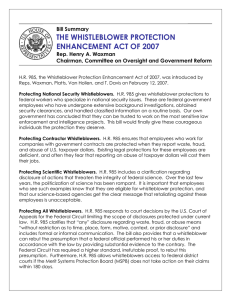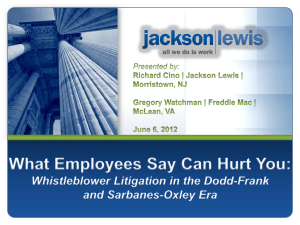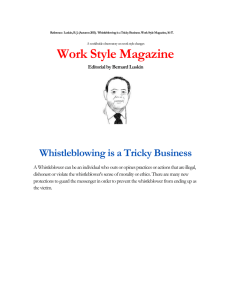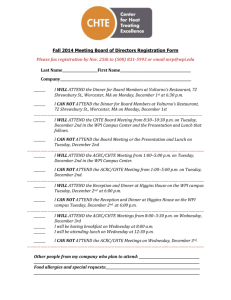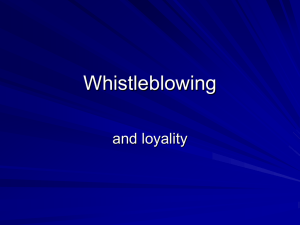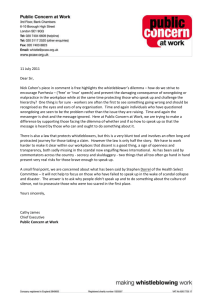The Whistleblower Protection and Reward System of Korea 1. Protection of
advertisement
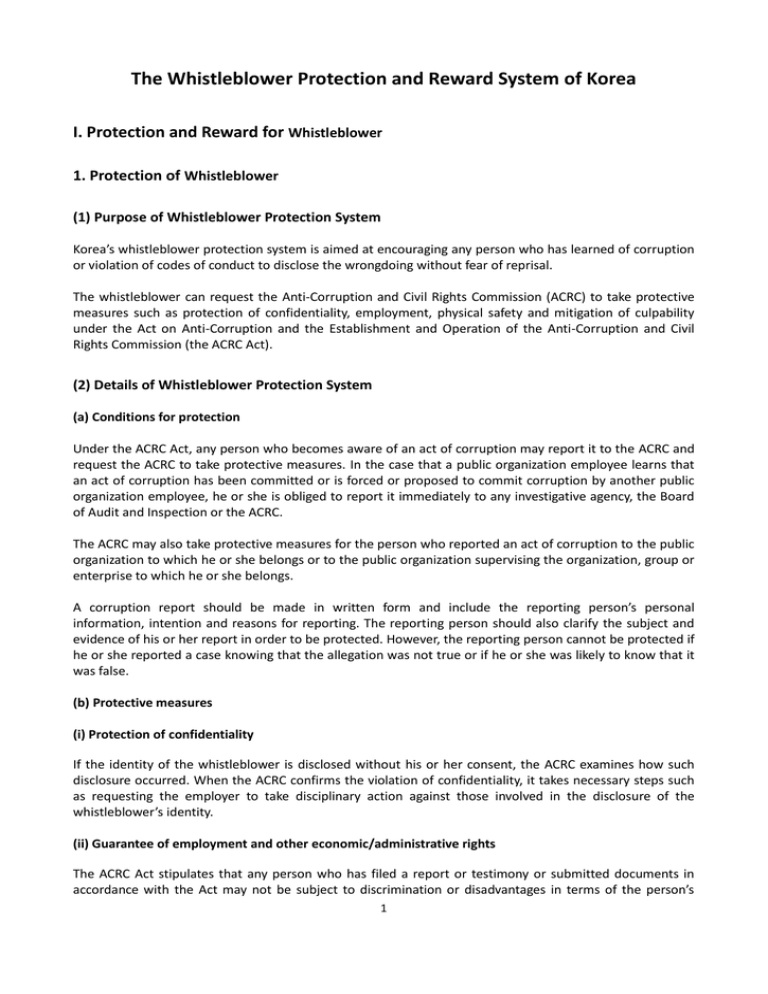
The Whistleblower Protection and Reward System of Korea I. Protection and Reward for Whistleblower 1. Protection of Whistleblower (1) Purpose of Whistleblower Protection System Korea’s whistleblower protection system is aimed at encouraging any person who has learned of corruption or violation of codes of conduct to disclose the wrongdoing without fear of reprisal. The whistleblower can request the Anti-Corruption and Civil Rights Commission (ACRC) to take protective measures such as protection of confidentiality, employment, physical safety and mitigation of culpability under the Act on Anti-Corruption and the Establishment and Operation of the Anti-Corruption and Civil Rights Commission (the ACRC Act). (2) Details of Whistleblower Protection System (a) Conditions for protection Under the ACRC Act, any person who becomes aware of an act of corruption may report it to the ACRC and request the ACRC to take protective measures. In the case that a public organization employee learns that an act of corruption has been committed or is forced or proposed to commit corruption by another public organization employee, he or she is obliged to report it immediately to any investigative agency, the Board of Audit and Inspection or the ACRC. The ACRC may also take protective measures for the person who reported an act of corruption to the public organization to which he or she belongs or to the public organization supervising the organization, group or enterprise to which he or she belongs. A corruption report should be made in written form and include the reporting person’s personal information, intention and reasons for reporting. The reporting person should also clarify the subject and evidence of his or her report in order to be protected. However, the reporting person cannot be protected if he or she reported a case knowing that the allegation was not true or if he or she was likely to know that it was false. (b) Protective measures (i) Protection of confidentiality If the identity of the whistleblower is disclosed without his or her consent, the ACRC examines how such disclosure occurred. When the ACRC confirms the violation of confidentiality, it takes necessary steps such as requesting the employer to take disciplinary action against those involved in the disclosure of the whistleblower’s identity. (ii) Guarantee of employment and other economic/administrative rights The ACRC Act stipulates that any person who has filed a report or testimony or submitted documents in accordance with the Act may not be subject to discrimination or disadvantages in terms of the person’s 1 employment or working conditions from the institution, group or company to which the reporter belongs. If the reporter suffers or is likely to suffer any disadvantageous measures for having filed a report, he or she can request the ACRC to take necessary actions to protect his or her employment, including reinstatement. If the ACRC finds the request for protection to be reasonable, it may require the head of the institution involved to take necessary steps, which the head of institution should follow unless there are justifiable reasons not to do so. If the reporting person who is a public official requested protective measures for personnel management and the request is found to be reasonable, the ACRC can request the Ministry of Personnel Management or the head of institution in charge to follow the request. The ACRC may make a request to the employer or disciplinary officer to take disciplinary action against the person who subjected the whistleblower to discrimination or disadvantages in terms of employment status or working conditions, and may directly impose a penalty not exceeding KRW 10 million on that person. When the person who took discriminatory action does not follow the ACRC’s demand, he or she will be punished with imprisonment of up to 1 year or a fine not exceeding KRW 10 million. (iii) Physical protection The reporting person can ask for protective measures when the person, his or her family members, or cohabitants feel threatened as a result of whistleblowing. When the ACRC finds the requested protective measures necessary, it can request for protection to the chief officer of the police station in charge. The chief of the police station that received this request should take protective measures for the reporting person such as protection at a specific place or facility, provision of a bodyguard, provision of escort on his or her way to and from the police to give testimony as a reference person or witness, regular patrolling around the residence, and any other measures deemed necessary to protect the safety of the reporting person. (c) Other protective measures If a person reports an act of corruption in accordance with the ACRC Act and the reporting person himself or herself is found to be involved in the crime, punishment for the crime may be mitigated or exempted for the whistleblower. This can be applied mutatis mutandis to any disciplinary action taken by a public institution. In addition, if a person reports an act of corruption under the ACRC Act, it will be deemed that the reporting person has not violated the obligation of confidentiality in the performance of his or her duty regardless of provisions under other laws, collective agreements or employment regulations. (3) Statistics of Whistleblower Protection Cases Over the past 7 years since the launch of the ACRC in 2008, there were a total of 132 requests for protective measures for reporting persons or cooperators, which yields an average of 19 cases per year. In 2014 alone, there were a total of 25 requests for protection (16 cases for guarantee of employment, 3 cases for physical protection, and 6 cases for examination of the disclosure of identity). Protective measures were taken for 31 cases (30%) among the 105 cases for which the reporting person requested guarantee of employment. Aside from these cases, 1 case was dismissed, 18 cases were canceled, and 49 cases were closed, while 6 cases are currently under investigation. Disadvantageous measures against the whistleblowers were invalidated for all 31 cases (100%).In terms of cases where a penalty was imposed for the violation of the protection of confidentiality, there were a total of seven cases since 2008--3 2 cases in 2009, 1 in 2010, 1 in 2012, and 2 in 2013. The total amount of penalty imposed was KRW 30.5 million, which is an average of KRW 4.35 million in penalty per case. Since 2008, a total of 16 requests for physical protection have been made, among which 14 cases were accepted and 2 were closed. During the same period, there have been 16 requests for examination of the disclosure of the whistleblower’s identity. The ACRC requested disciplinary action to be taken against those involved in the disclosure for 5 cases. 8 cases were closed, and 3 cases are currently under investigation. 2. Reward and Award for Corruption Reporters (1) Purpose and Details of Whistleblower Reward System The reward and award system for corruption reporters is to provide financial reward for whistleblowers whose disclosure resulted in recovering misspent public funds or increasing revenues of public institutions, or contributed to the enhancement of the public interest. The system is an effective anti-corruption tool to attract more public involvement in whistleblowing by rewarding an individual’s courageous action in the interest of the public, despite the many risks the action can entail. (a) Payment of award If a disclosure leads to a substantial financial benefit, prevents financial loss of public institutions, or benefits the public interest, the reporting person can be recommended for an award under related laws such as the Awards and Decorations Act and receive an award as prescribed by the Enforcement Decree of the ACRC Act. The reporting person may receive financial award not exceeding KRW 100 million. If the person discloses that he or she received money or other valuables, up to 20% of the amount received, but not exceeding KRW 200 million, can be provided as an award. (b) Payment of reward Unlike awards, rewards for reporting corruption are provided upon request by the reporting person, if the report led to the recovery or increase in revenues of a public institution or the reduction of costs, or when related legal matters have been finalized regarding the disclosure. The amount of reward may range from 4% to 20% of the amount of the recovered assets according to the total amount of increased revenues or saved expenses. The maximum amount of reward is KRW 2 billion. (2) Statistics of Reward and Award Payments From 2008 to 2014, KRW 477.6 million has been provided as award money in 58 cases where disclosures led to a substantial increase in revenues of public institutions, prevented financial loss of public institutions, or contributed to enhancing the public interest. Over the same period, a total of KRW 57.69 billion was recovered as a result of whistleblowing. KRW 6.04 billion was paid in reward for 180 cases, which is 10.4% of the recovered public funds. The average reward per case amounted to KRW 33.57 million. 3 II. Protection & Reward for Public Interest Whistleblowers 1. Overview As the way of people’s lives is becoming more complicated, violations of the public interest by the private sector are causing serious social disturbances and financial loss to society as a whole. However, there had been loopholes in the legal system of Korea that made it difficult to protect whistleblowers of public interest violations in the private sector against retaliatory measures. The previous whistleblower protection system under the ACRC Act was limited to those who made disclosures of corrupt acts in the public sector, such as the acceptance of bribes by public officials and waste of government funds. To address this problem, the Act on the Protection of Public Interest Whistleblowers was enacted in March 2011, and took effect on September 30, 2011. The main purpose of the new whistleblowing Act is to protect and provide support for public interest whistleblowers while preventing and controlling public interest violations in the private sector which can have a direct impact on people’s daily lives. 2. Protective Measures (1) Protected Reports A protected report under the Act on the Protection of Public Interest Whistleblowers is a disclosure of a “violation of the public interest,” which is an act that infringes on the health and safety of the public, the environment, consumer interests and fair competition and that is subject to the penal provisions defined in the laws listed in the Act and its Enforcement Decree (currently 180 laws including the Food Sanitation Act and the Wastes Control Act). (2) Where to Make a Report Any person may report a violation of the public interest to the representative or employer of a person, institution, organization, company, etc. that may violate or has violated the public interest; the administrative agency or supervisory body that has the authority to direct, supervise, regulate or investigate violations of the public interest; investigative agency; member of the National Assembly; public organization established pursuant to the laws related to public interest violations; or the ACRC. (3) Protection & Reward for Whistleblowers The measures to protect public interest whistleblowers include prohibition of disclosing personal information of the whistleblower, protection of physical safety, mitigation and remission of culpability, and withdrawal of disadvantageous measures against the whistleblower. Those who violated the Act will be subject to imprisonment for a term not exceeding 3 years or a fine not exceeding KRW 30 million. “Disadvantageous measures” under the Act include an unfavorable personnel action such as dismissal and suspension from office, economic disadvantage such as discrimination in the payment of wages and termination of a contract for goods or services, administrative disadvantage such as cancellation of a license or permit, and actions that causes psychological harm such as bullying. The public interest whistleblower may receive a financial reward of up to KRW 1 billion if his or her whistleblowing has resulted directly in the recovery of or increase in revenues for the central or local governments through the imposition of penalties or fines for negligence. 4 The public interest whistleblower may also receive relief money if he or she has faced damages or spent money on the grounds of his or her whistleblowing such as expenses for medical treatment, expenses for proceedings, and losses in wages during the period the disadvantageous measures were in effect. 3. Statistics on the Protection & Reward for Public Interest Whistleblowers (1) Statistics on Public Interest Whistleblower Protection Since the Public Interest Whistleblower Protection Act took effect on September 30, 2011, the ACRC handled a total of 51 requests for whistleblower protection by December 2014, including 23 cases which requested for protective measures and 15 cases which requested for protection of confidentiality. A total of 17 cases were accepted, including 8 cases of protective measures, 4 cases of physical protection, 3 cases of protection of confidentiality, 1 case of prohibition of disadvantageous measures, and 1 case of mitigation of culpability. (2) Statistics on Reward for Public Interest Whistleblowers Since the implementation of the new whistleblowing Act, a total of KRW 653 million was offered for 1,008 disclosure cases. As public awareness of the reward system has been growing, the number of disclosures meeting the requirements for reward payment has increased as well. In 2014, a total of KRW 397 million was provided in reward money to 657 whistleblowers. This figure is a 14-fold increase from 2012 (KRW 28 million), and a 1.7-fold increase from 2013 (KRW 227 million). Reporting Corruption vs. Public Interest Violation Corruption Public interest violation Laws Act on Anti-Corruption and the Establishment & Operation of ACRC (Enforcement on Jan. 25, 2002) Act on the Protection of Public Interest Whistleblowers (Enforcement on Sep. 30, 2011) Subjects of report Corruption related to public officials’ performance of duties Corruption related to contracts, budget, & properties of public agencies Forcing, recommending, or suggesting the above acts Where to file a report ACRC, investigative authorities, Board of Audit & Inspection, etc. Companies, competent public agencies, National Assembly members, ACRC, investigative authorities, BAI, etc. Reporting person Anyone including foreigners Anyone including foreigners Disclosure Report with real name Report with real name Violation of public health, safety, the environment, consumer interests, & fair competition → Breaches of 180 laws Rewards & Awards for Whistleblowers Rewards Corruption Public interest violation Increasing or recovering revenues of a public organization Increasing or recovering revenues of a public organization * Up to KRW 2 billion, 4-20% of the assets to be recovered * Up to KRW 1 billion, 4-20% of the assets to be recovered Damage caused due to whistleblowing Relief money Awards - * Expenses for physical or psychological treatment, moving caused by job transfer, litigation procedures, etc. Bringing financial benefits or preventing financial damage to a public organization, or serving the public interest 5 -
